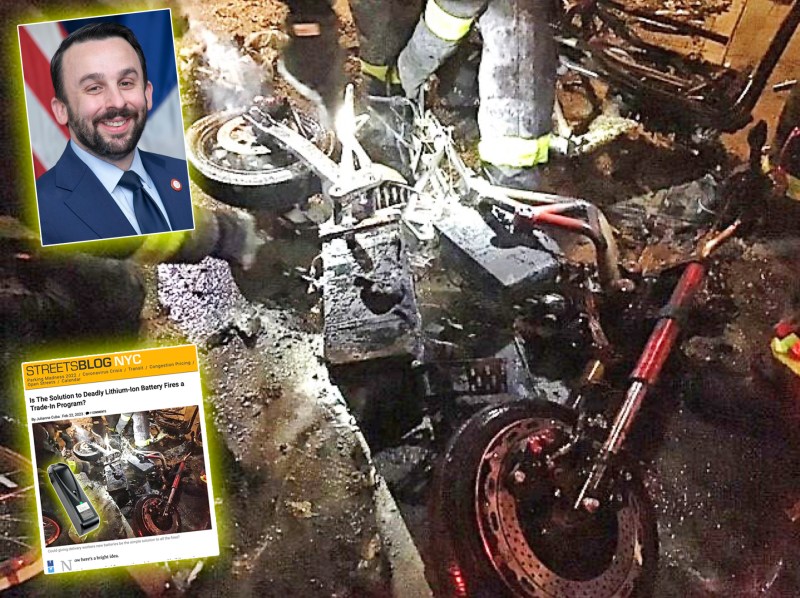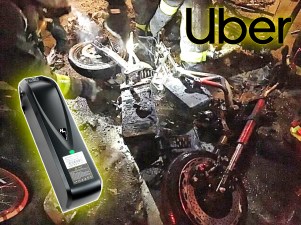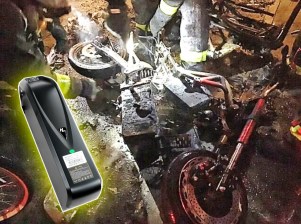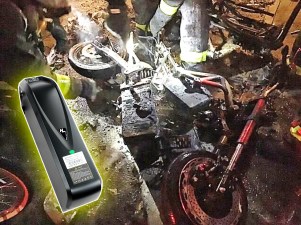Streetsblog Gets Action: Battery ‘Buy-Back’ Program and Other Lithium-Ion Bills Advance in Council

Great minds think alike.
A Manhattan City Council member introduced legislation on Thursday that would create a citywide “buy back” program for the kind of defective or uncertified lithium-ion batteries that have sparked dozens of fires — a proposal that comes two weeks after Streetsblog proposed it.

Council Member Keith Powers (D-Manhattan) said he was working on the bill since the summer, as the Council was taking up overlapping bills to address growing concerns about fires that are sometimes linked to the batteries that have dramatically increased electric bike and e-moped use among delivery workers. Indeed, Powers’s bill would seek to mitigate the punitive element of another battery bill that passed the Council on Thursday — Bronx Council Member Oswald Feliz’s prohibition on the sale of uncertified batteries that critics say would leave delivery workers in the cold.
“Oswald’s bill would shut down the market for uncertified batteries within six months, and a battery swap program would add balance,” Powers said. “We don’t want to penalize businesses and workers without thinking about this strategically.”
Powers told Streetsblog that he shares concerns about uncertified batteries — indeed, one or more such batteries sparked a fatal fire in his Midtown district that injured more than 40 people — but basic humanity requires the Council to help the worker whose livelihoods depend on getting around quickly to make the deliveries that many well-to-do New Yorkers demand.
“There is a public safety issue related to these fires, but when you look at the our city — our workers and people who rely on the bikes and do the things we want them to do every day — we have to make sure that alongside shutting down the market for unsafe batters, we remember that there are people affected by this,” Powers said. “The delivery workers are people who want to do their jobs and be in compliance. And let’s not forget, the folks using the bikes, and their families, are also in jeopardy.” (The Fire Department said there were roughly 220 fires sparked by lithium-ion batteries in 2022, up from 44 such fires in 2020. Not all lithium-ion battery fires are linked to electric bikes or mopeds. The batteries are common in many household devices.)
Beyond the battery swap bill (Intro 949), Powers’s other bill, Intro 950, would require delivery companies such as GrubHub and Uber Eats to provide their delivery workers “with fireproof containers suitable for charging removable storage batteries used to power these bicycles.”
SIDEBAR: DELIVERY WORKERS WANT COUNCIL EFFORT TO BE BETTER, BROADER
Powers likened that bill to an effort a few years ago to require delivery companies to give workers insulated bags, a necessity for that kind of work, rather than forcing them to buy them themselves.
Powers could not put a price tag on his battery-swap bill, but promised to make sure the bill would not allow workers to simply buy cheap batteries for a few hundred dollars and then swap them for certified power packs, which can cost more than $1,000. Given that there are 65,000 delivery workers right now, it seems safe to say that such a program would cost $65 million over the few years it would take to swap out all the old batteries with new ones.
The latest effort on lithium-ion power packs came as the Council overwhelmingly passed a slate of previously heard bills on batteries.
Some were so anodyne that it was hard to believe the Council even needed to pass them. For example, Intro 656 (by Manhattan Council Member Gale Brewer) requires the FDNY to develop “an information campaign to educate the public on the fire risks” posed by lithium-ion powered devices. (The FDNY already has a budget for public information campaigns, and Brewer even acknowledged that the bill “asks the Fire Department to do what it is already doing.”) And Intro 749 (Alexa Avilés) requires the Department of Consumer and Worker Protection (hence the name) to create and share educational materials on e-bike safety risks for delivery workers. “It would also require third-party delivery apps, such as Seamless and UberEats, to distribute these materials to their delivery workers.”
But the other bills stake out new substantive territory for the Council and the industry:
- Intro 663 (Feliz) would prohibit the sale of uncertified batteries or those not approved by reputable organizations such as Underwriters Laboratory.
- Intro 752 (Brewer) would prohibit the sale and assembly of second-use lithium ion batteries. “In layman’s terms, it’s a battery that has been reconstituted,” Brewer said on Thursday.
- Intro 722 (Robert Holden) requires the FDNY to publish an annual report on all fires caused by powered mobility devices, including details like the geographic location and circumstances of each fire, and building type at which it occurred. This was the lone bill in the package that the FDNY opposed — on the grounds that it is not “the best use of resources,” Acting Chief of Fire Prevention at FDNY Thomas Currao testified last year. He raised issues with the trouble the FDNY would have with a bill because of “what it might take to gather and produce all of the elements in this report.” (The FDNY concerns were not mentioned on Thursday as the bill passed.)
During Thursday’s Fire and Emergency Management Committee vote on the package, several Council members said that the bills were only the start.
“We’re just trying to figure out how we can be successful in supporting the deliveristas at the same time being safe,” said Brewer. “Workers have three batteries a day because they’re making so many deliveries, so they need to charge them but also be safe.”
Both she and Council Member Lynn Schulman (D-Queens) want the tech giants to foot more of the cost of the safety initiatives.
The union representing the city’s delivery workers agreed that the worst place to put the costs is on the workers whose livelihoods depend on keeping their costs down.
“Electric micromobility devices are the most essential tool of work for deliveristas to meet their brutal delivery schedules,” Ligia Guallpa of the Workers Justice Project wrote in Streetsblog on Thursday (with Elizabeth Adams of Transportation Alternatives). “In addition to the e-bike, deliveristas invest between $500 to $800 for battery replacements. Without access to charging stations, deliveristas have no other option than to recharge their e-bike batteries at home or rent a parking garage — something that few can afford.”
The Adams Administration has proposed turning abandoned newsstands into charging hubs for delivery workers. But that effort has already been undermined; Community Board 7 on the Upper West Side found a way to reject the transformation of a decrepit former newsstand into a modern charging station at W. 72nd Street, as I Love the Upper West Side reported.
All of the action on Thursday — the package of bills (which passed unanimously except for one no vote against Feliz’s bill) and the introduction of the Powers package — showed that the Council is seeking to move quickly on both fire safety and also supporting workers. In her own speech advocating for the passage of the bills before the full Council, Speaker Adrienne Adams said the target of the bills was not delivery workers, but the commercial operations that sell them faulty or substandard batteries. And Council Member Shahana Hanif (D-Park Slope) called on her colleagues to build out charging infrastructure citywide and always “keep workers” at the center of their policy decisions.
Powers said he was encouraged by how many Council members were focusing on making workers’ lives and workplaces safer rather than simply legislating them out of existence.
“Everyone is addressing this in good faith and with a real sense of urgency,” he said.





